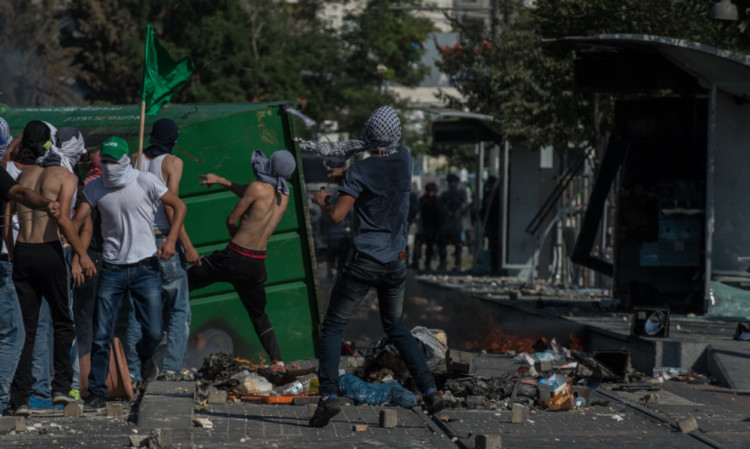As the violence and bloodshed in Gaza continue to escalate, Courier contributor and Dundee University student Jalal Abukhater writes a personal viewpoint from the front line in Palestine.
The situation in my home country, Palestine, hasn’t been great for years. However, we do often experience periods of edgy tranquillity where it is relatively safe for a Palestinian to walk in a Jerusalem street without being attacked, where the Occupied West Bank isn’t in full uprising mode, and besieged Gaza isn’t being pummelled by hundreds of bombs daily by the Israeli army.
When I left Dundee in June to spend time in Jerusalem, I was expecting a relaxed summer that I could spend with my family and friends. Having been in Scotland for the last 10 months, I was looking forward to making the most of our warm weather and sunny beaches. I expected to come back to the normal not-so-great situation, where the occupation and a difficult daily life is something we get used to.
What I actually came back to was a situation where everything was kicking-off in Arab cities of Israel, in Gaza, and all over the West Bank. As I arrived in Palestine, I was welcomed by two disturbing events. The first was the discovery of the bodies of three Israeli teenagers who were kidnapped from the West Bank by unknown assailants. Israel was quick to suggest the kidnappers were likely to be tied to the political group Hamas. The discovery of the three teenagers’ bodies led to an unprecedented level of incitement from Israeli politicians, led by the Israeli Prime Minister Benjamin Netanyahu, who said: “Hamas is responsible, Hamas will pay,” despite Hamas denying it had anything to do with the kidnapping.
This led to the start of an Israeli bombing campaign in Gaza and a large military operation in the West Bank, where hundreds of Palestinians were arrested without cause. Collective punishment by the Israeli state is what we called it. However, in Jerusalem, the situation was scary, as hundreds of Israeli extremists have taken to the streets chanting “death to Arabs,” attacking random Palestinians, and attempting to seek revenge.
This leads us to the second disturbing event I arrived home to.
The first victim of this incitement was a 17- year-old kid from my neighbourhood, named Mohammad Abukhdeir.
Abukhdeir was kidnapped by Jewish extremists early on a Wednesday morning. He was forced to drink gasoline and was then burned alive. The discovery of his body hours later fuelled an eruption of protests all around Palestine and Israel. The situation wasn’t normal anymore. This escalation in events was the worst in years. The street in front of my house became a battleground where Palestinian protesters clashed with Israeli police for days on end. Palestinians in Jerusalem, including my family, have lost faith in the Israeli police trying to protect them.
With the increase in calls by Jewish extremists for revenge, Palestinians were helpless and believed that sticking together was the only way to protect themselves and their families from those extremist attacks. My cousin, who lives with his family just down the street from us, was forced to keep a baseball bat next to the front door to get a sense of safety in the midst of this chaos.
This recent escalation has increased the tensions between Palestinians and Jewish Israelis like never before. I, and many Palestinians, no longer feel safe walking on my street at night unaccompanied, and neither do we feel safe taking a bus filled with Jewish Israelis alone. The exact opposite is also true, Israelis avoided entering Palestinian neighbourhoods for the same reason.
Social media filled with amateur videos of mobs chanting “death to Arabs” in the Jerusalem streets I’ve watched videos of Arab passengers being attacked on the buses that I use to commute to the beach, as well as videos of Palestinian workers in Jerusalem being encircled by Israeli police in order to protect them from being attacked by extremist mobs.
I may have been a bit naive to think so, but I never thought to see this atmosphere of intense hate taking over the city so easily. But I have also come to realise that as long as the leadership is irresponsible in its words and actions, anything is to be expected from the population. Today, a culture of hate and incitement has taken over and is affecting our daily lives.
I am sitting at home now, watching the news on TV, where UN sources confirm that in the past week of Israeli airstrikes in Gaza, more than 170 Palestinians have been killed and more than 1,200 injured; 70 per cent of the total casualties have been civilians.
Of course, I know there have been reports of rockets being fired into Israel from Gaza but the response has been out of proportion. I feel helpless as a reckless government is leading us all into a dark abyss and I cannot see a light at the end of it. Whether in the West Bank, Jerusalem, Tel Aviv, or Gaza, I am scared of what the eventual outcome could be. As a person who believed strongly that one day there will be coexistence under a peaceful and just solution, I am terrified by the thought that I’m losing hope something I haven’t experienced before.
Mr Abukhater, 19, is studying politics and international relations. He is also an editor for the student magazine and the current president of the school of humanities at Dundee.
